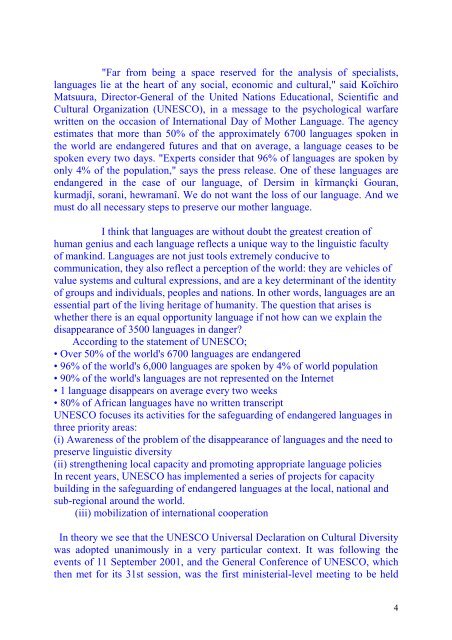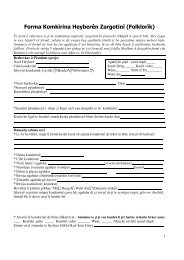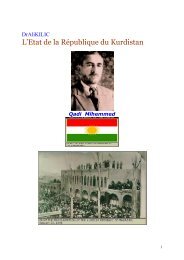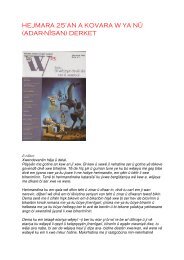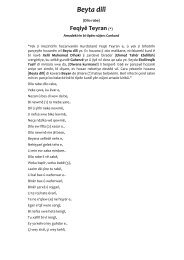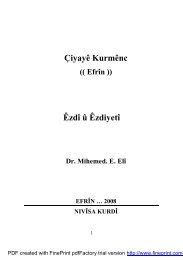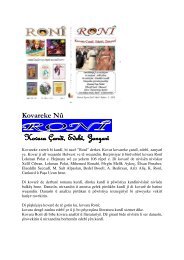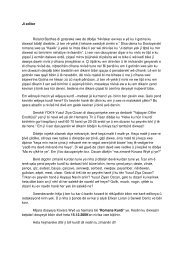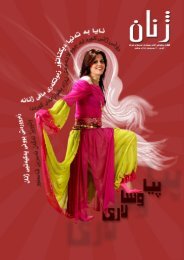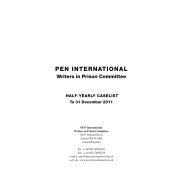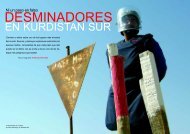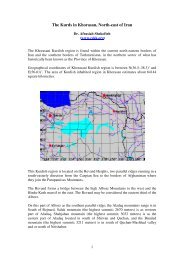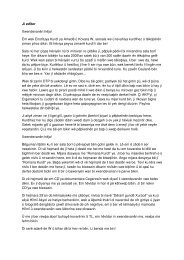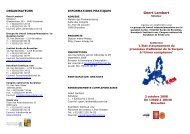UNESCO and The International Day of Mother Language - Pen-Kurd
UNESCO and The International Day of Mother Language - Pen-Kurd
UNESCO and The International Day of Mother Language - Pen-Kurd
- No tags were found...
Create successful ePaper yourself
Turn your PDF publications into a flip-book with our unique Google optimized e-Paper software.
"Far from being a space reserved for the analysis <strong>of</strong> specialists,<br />
languages lie at the heart <strong>of</strong> any social, economic <strong>and</strong> cultural," said Koïchiro<br />
Matsuura, Director-General <strong>of</strong> the United Nations Educational, Scientific <strong>and</strong><br />
Cultural Organization (<strong>UNESCO</strong>), in a message to the psychological warfare<br />
written on the occasion <strong>of</strong> <strong>International</strong> <strong>Day</strong> <strong>of</strong> <strong>Mother</strong> <strong>Language</strong>. <strong>The</strong> agency<br />
estimates that more than 50% <strong>of</strong> the approximately 6700 languages spoken in<br />
the world are endangered futures <strong>and</strong> that on average, a language ceases to be<br />
spoken every two days. "Experts consider that 96% <strong>of</strong> languages are spoken by<br />
only 4% <strong>of</strong> the population," says the press release. One <strong>of</strong> these languages are<br />
endangered in the case <strong>of</strong> our language, <strong>of</strong> Dersim in kîrmançki Gouran,<br />
kurmadjî, sorani, hewramanî. We do not want the loss <strong>of</strong> our language. And we<br />
must do all necessary steps to preserve our mother language.<br />
I think that languages are without doubt the greatest creation <strong>of</strong><br />
human genius <strong>and</strong> each language reflects a unique way to the linguistic faculty<br />
<strong>of</strong> mankind. <strong>Language</strong>s are not just tools extremely conducive to<br />
communication, they also reflect a perception <strong>of</strong> the world: they are vehicles <strong>of</strong><br />
value systems <strong>and</strong> cultural expressions, <strong>and</strong> are a key determinant <strong>of</strong> the identity<br />
<strong>of</strong> groups <strong>and</strong> individuals, peoples <strong>and</strong> nations. In other words, languages are an<br />
essential part <strong>of</strong> the living heritage <strong>of</strong> humanity. <strong>The</strong> question that arises is<br />
whether there is an equal opportunity language if not how can we explain the<br />
disappearance <strong>of</strong> 3500 languages in danger<br />
According to the statement <strong>of</strong> <strong>UNESCO</strong>;<br />
• Over 50% <strong>of</strong> the world's 6700 languages are endangered<br />
• 96% <strong>of</strong> the world's 6,000 languages are spoken by 4% <strong>of</strong> world population<br />
• 90% <strong>of</strong> the world's languages are not represented on the Internet<br />
• 1 language disappears on average every two weeks<br />
• 80% <strong>of</strong> African languages have no written transcript<br />
<strong>UNESCO</strong> focuses its activities for the safeguarding <strong>of</strong> endangered languages in<br />
three priority areas:<br />
(i) Awareness <strong>of</strong> the problem <strong>of</strong> the disappearance <strong>of</strong> languages <strong>and</strong> the need to<br />
preserve linguistic diversity<br />
(ii) strengthening local capacity <strong>and</strong> promoting appropriate language policies<br />
In recent years, <strong>UNESCO</strong> has implemented a series <strong>of</strong> projects for capacity<br />
building in the safeguarding <strong>of</strong> endangered languages at the local, national <strong>and</strong><br />
sub-regional around the world.<br />
(iii) mobilization <strong>of</strong> international cooperation<br />
In theory we see that the <strong>UNESCO</strong> Universal Declaration on Cultural Diversity<br />
was adopted unanimously in a very particular context. It was following the<br />
events <strong>of</strong> 11 September 2001, <strong>and</strong> the General Conference <strong>of</strong> <strong>UNESCO</strong>, which<br />
then met for its 31st session, was the first ministerial-level meeting to be held<br />
4


